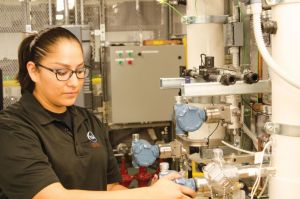

Two women alumni of the ESTEC program at Idaho State University credit the POWER Careers project with helping them persist in the rigorous academic program that prepared them to become nuclear processing technicians at Fluor Idaho, LLC.
“The skills that they brought with them coming out of this program—they had a high degree of math aptitude—that really gave them the foot through the door,” said Shannon Bowman, human resources manager at Fluor Idaho. Another plus for Monique Gallegos and Samantha Phillips was “the fact that they were very familiar with different types of energy generation, and that they had exposure through the ESTEC program to terminology that’s typically used in the nuclear industry.”
In a Power Careers video Gallegos, Phillips, and other women talk candidly about their academic pursuits and careers. Providing Opportunities for Women in Energy Related (POWER) Careers is an ATE project that is testing strategies to recruit and retain women for the five associate degree programs offered by the Energy Systems Technology and Education Center (ESTEC) at Idaho State University in Pocatello, Idaho.
The Potential to Change Women’s Financial Circumstances
Nancy R. Lauts, POWER Careers principal investigator, said that ESTEC faculty and staff want to bring more females into the program, particularly women who are 25 and older, because of the potential for this historically underrepresented population to excel as energy technicians who earn salaries that range from $55,000-$70,000.
“For me it’s not so much the technology, it’s the transforming of lives,” Lauts said, explaining that it is exciting for her to witness the changes that occur when women transition from low-wage jobs to careers that allow them to support their families well.
In a separate phone interview Monique Gallegos shared that since she began working at Fluor Idaho in January 2017 she has started a college savings fund for her son, replaced her old vehicle with a reliable pickup truck, and taken two vacations—one to see her mom in Kentucky for the first time since 2009.
“I went from making $250 to $300 every two weeks, to making in a week what I would make in a month. Yes, it’s been a whole lot different,” Gallegos said. A single parent and primary caregiver to her ill father, Gallegos shared that in her third semester in ESTEC’s Nuclear Operations Technology program she held four part-time jobs.
Probably the best thing about her new career is that she enjoys her work in remediation and processing of nuclear waste at the Idaho National Lab. “I love the hands-on: getting out there; putting on the gloves; running the fork lift; running the cranes—even just turning valves to make the process flow; pulling things apart; putting them back together. That’s the most fun that I’ve ever had in a job,” Gallegos said. In addition to working full time she is also taking online courses in nuclear engineering and may eventually pursue a Ph.D. in nuclear physics.
The Power of Intentional Conversations over Coffee
Gallegos and Phillips, who now work on the same team at Fluor Idaho, were already enrolled in ESTEC courses when POWER Careers’ outreach started. (From another program, Phillips had received tutoring before taking ESTEC’s pre-requisite math exam.) Pre-enrollment tutoring is one of the strategies that POWER Careers uses along with one-on-one coaching and career information programs to encourage women. Gallegos and Phillips said that they and most of the women in ESTEC’s program plugged into POWER Careers’ services; by fall 2016 they noticed that there were more women in their classes.
Lauts reports that female enrollment has increased from two women among 36 incoming students in Fall 2014 (6% of ESTEC’s enrollment) to 11 women among the 53 incoming students in Fall 2017 (21% of ESTEC’s enrollment).
As more women enroll, Lauts anticipates that their consistent participation will attract other women. “We think that success builds success,” she said.
Retention has been extremely strong. Of the 27 women who have started at ESTEC since fall of 2015, only one woman did not graduate or continue in the program.
“What I liked the most was the networking and the support,” Samantha Phillips said, explaining that in addition to ESTEC’s attentive faculty who “make themselves available if you need extra help” it was the Power Careers Coffees that led to her “new competitive career and really good wages.”
Of the coffees and one-on-one breakfasts offered by Jodi Johnson, POWER Careers project coordinator, Phillips said, “It’s a pretty intense work load, and it’s just nice to get together and hear other people’s approaches to certain things, and talk about other resources [that] maybe you didn’t know about—if you need extra help, or what they did to get through the class,”
Gallegos said it was “terrifying” to be in college nearly 20 years after graduating from high school, but the coffee meetings that featured previous female graduates provided a critical bridge to the future she wanted. “Being able to see someone who went through the program and actually in the field working, it was a sense of validation,” she said. After she graduated and before she went to work at Fluor Idaho, Gallegos was employed as a peer mentor for the POWER Careers project.
Why Math Aptitude Matters & Other Employer Expectations
Bowman explained that at Fluor Idaho nuclear processing requires more than entry-level skills and that math skills are considered when job applications are screened.
“The types of skills that young women like Monique and Samantha bring to the table, I’ll be honest with you, they are unusual to find. It’s very difficult to find females with those skills. And it’s wonderful for us because it brings diversity of thought, diversity of experience into our workplace,” Bowman said. Historically most of the people with the qualifications to work as nuclear processing technicians have been men who are military veterans with experience in nuclear-powered Navy vessels or they are former construction workers.
“There are some pretty detailed calculations that have to happen when you are dealing with any kind of nuclear waste because you constantly have to be aware that there’s a possibility of reaction with the atomic particles. Because they do decay in the waste, but they are still there. We have to be comfortable that somebody has the level of knowledge about algebraic equations, trigonometric functions, and to a certain degree calculus, and they are comfortable doing those things to anticipate where we could have a problem.”
Referring to Gallegos and Phillips, Bowman said, “Both of these individuals came to us with an organized skill set, solid STEM knowledge, and a work ethic that they got through the program—and probably through their life experience. [Since] they came here they adapted well to the environment, and they are off and running.”

 Subscribe
Subscribe


 See More ATE Impacts
See More ATE Impacts

Comments
There are no comments yet for this entry. Please Log In to post one.